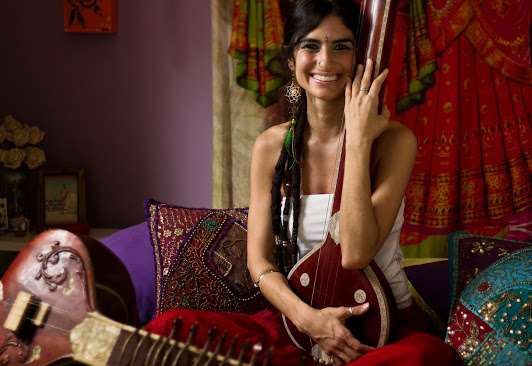It was her parents’ love for sitar exponent Pandit Ravi Shankar that introduced Paola Carraro to Indian art and music far away in Brazil Writes Debaprio D Choudhury in Asian Lite, Britains leading Asian Newspaper.
 Carraro, who started learning sitar from Ravi Shankar’s disciple Alberto Marsicano, says India was the biggest inspiration in her life and Indian culture continues to fascinate her.
Carraro, who started learning sitar from Ravi Shankar’s disciple Alberto Marsicano, says India was the biggest inspiration in her life and Indian culture continues to fascinate her.
“Indian music has always been a part of my life. My parents listened to Ravi Shankar and I always liked that sound. Growing up, I developed interest in the Beatles and Ravi Shankar. I was gradually discovering more about Indian culture that now fascinates me,” the 32-year-old Carraro said in an email interview from Sao Paulo.
Ravi Shankar’s music had a major influence on the Beatles – the rock band of John Lennon, Paul McCartney, George Harrison and Ringo Starr. Dubbed the “godfather of world music” by Harrison, Ravi Shankar helped millions of classical, jazz and rock lovers in the West to discover the centuries-old traditions of Indian music through his sitar. He shared a close relationship with Harrison.
Carraro was in India in 2011, and studied sitar with Pandit Bhuwan Chandra in Rishikesh in Uttarakhand.
“It’s a personal passion I have for India and its culture. That’s what has driven me to know more and more about all its cultural manifestations, like music, art in general, dance and everything that involves culture,” says Carraro, who also learnt kathak and tanpura in Rishikesh.
“I also found some Brazilian musicians who have dedicated themselves to the study of sitar. I bought my first sitar with the help of sitar player and multi-instrumentalist Marcus Santurys, who is now a close friend and with whom I usually play in recitals.”
Carraro, who performs at major cultural events in Brazil, says people-to-people contact between India and Brazil was growing gradually.
She gives credit to popular 2009 soap opera “Caminhos da India” (India – A Love Story) in Portuguese for sparking interest about India among Brazilians and also the opening of the Indian Cultural Centre in Sao Paulo on May 25, 2011.
“The cultural centre has played an important role in bringing to Brazil the opportunity of studying Indian art and culture, especially dance, yoga and Hindi language,” she said.
“Interest about Bollywood is growing gradually among Brazilians, especially after the soap opera ‘Caminhos da India’ was telecast all over the country. The soap opera showed a bit of Indian dance, music, customs and religious values.”
“Bollywood musicals and romances attract young Brazilians and they enjoy Indian movies. The joyful energy, the colours, the music and dance are too contagious,” Carraro says.
According to official records, Indian film weeks organised by the Indian embassy and consulates have always received good response from Brazilians.
Encouraged by the response, film weeks were organised by the Indian mission in August-September 2013 to celebrate “100 years of Indian Cinema” in seven Brazilian cities. The Brazilian postal department reciprocated by issuing a commemorative stamp in May 2014 on “100 years of Indian Cinema”.
Carraro also feels India and Brazil have never been as close as they are today and hopes there will be greater connection, including in art and culture.
She feels the BRICS – Brazil, Russia, India, China, South Africa – grouping will help in greater contact between the nations.
“With the creation of the BRICS, I believe there will be a greater connection between India and Brazil, including in cultural and educational areas. I feel there is greater possibility to broaden the knowledge that Brazilians have of Bollywood movies and Indian culture in general.”
Carraro, who has been practising yoga for the past 13 years, hopes to return to India.
“I intend to return to India soon to dedicate myself to the study of music and learn traditional Indian painting techniques.
“I am very grateful to the Indian people, who are always cheerful and welcoming,” she says.
The Indian community in the Latin American nation is small, numbering about 2,000, with the majority living in Sao Paulo, Rio de Janeiro and Manuas. Brazil’s total population is over 202 million.
The Indian embassy is located in Brasilia, while there are consulates in Belo Horizonte, Rio de Janeiro and Sao Paulo.